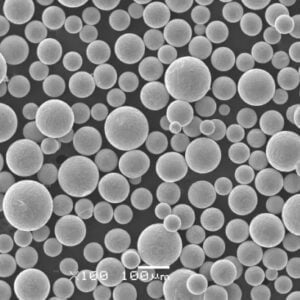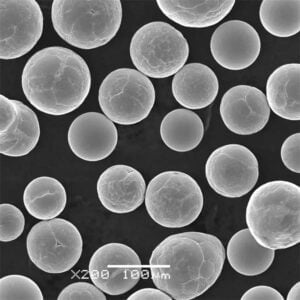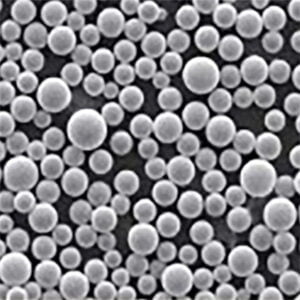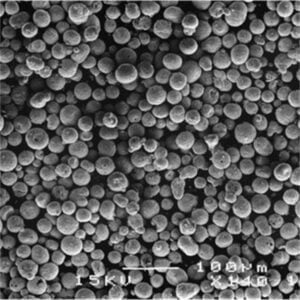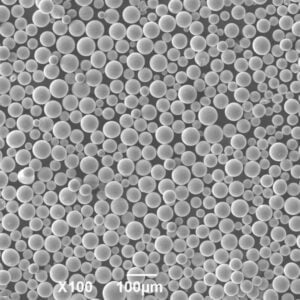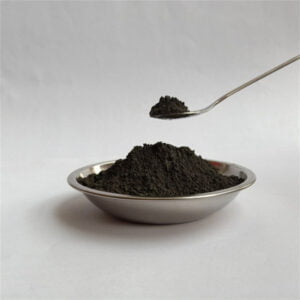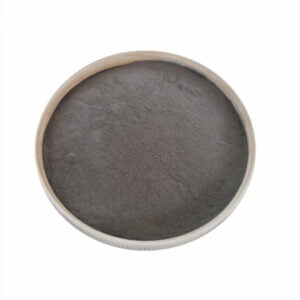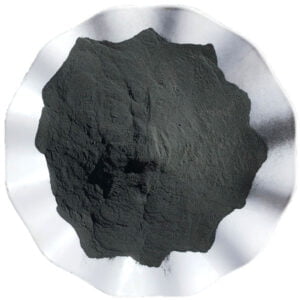Mezinárodní titanový prášek: vlastnosti, výroba a aplikace
Obsah
Titanový prášek je klíčovým materiálem používaným v několika významných průmyslových odvětvích díky svým jedinečným vlastnostem, jako je vysoký poměr pevnosti a hmotnosti, odolnost proti korozi a biokompatibilita. Tento článek poskytuje přehled typů titanového prášku, výrobních metod, globálních dodavatelských řetězců, cen a použití v leteckém, lékařském, automobilovém a dalších odvětvích.
Přehled titanového prášku
Titanový prášek označuje jemné kovové částice titanu, které se používají jako surovina pro výrobu dílů a součástí pomocí technik práškové metalurgie. Malá velikost částic vede k určitým výhodám oproti sypkému titanu.
Klíčové vlastnosti:
- Vysoký poměr pevnosti a hmotnosti
- Odolnost proti korozi
- Schopnost odolávat extrémním teplotám
- Biokompatibilita
- Umožňuje složité geometrie dílů
Specifikace prášku:
| Parametr | Podrobnosti |
|---|---|
| Čistota | Titan třídy 1 až 4 (99,5-99,995% Ti) |
| Tvar částic | Sférické, úhlové nebo smíšené |
| Velikost částic | obvykle 15-250 mikronů |
| Způsob výroby | Atomizace, hydrid-dehydrid, elektrolýza |
Třídy a legující prvky:
Titanový prášek je k dispozici v různých jakostních třídách - komerčně čistý CP1 až CP4 a nejběžnější slitina Ti 6Al-4V třídy 5. Ostatní slitiny obsahují Mo, Zr, Sn, Si, Cr, Fe, O, Nb, Ta, W pro zlepšení vlastností.
Běžné formy:
- Prášek - sypký nebo slisovaný do tablet
- Drát
- Rod
- Zakázkové díly a komponenty
Vysoká reaktivita titanu znamená, že jej nelze vyrábět pouze metodami tavení a lití. Pokročilé techniky výroby a konsolidace prášku jsou nezbytné pro využití schopností titanu v různých průmyslových odvětvích.
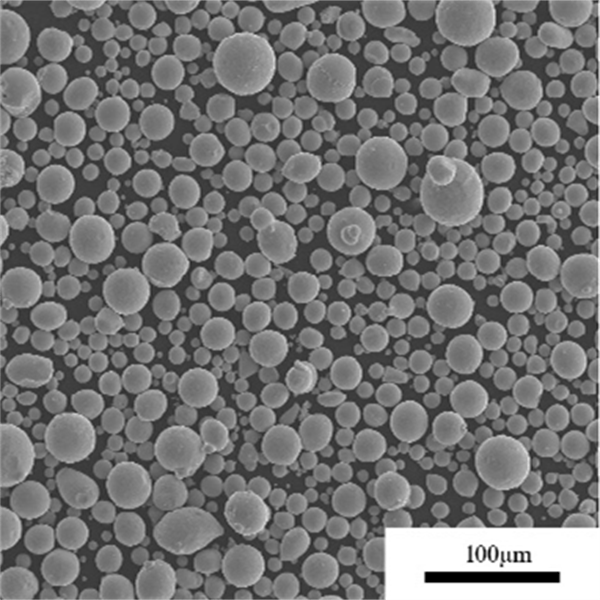
Globální dodávky a výroba titanového prášku
Metody výroby titanového prášku, objemy, kvalita, náklady a udržitelnost mají zásadní vliv na použitelnost.
Hlavní výrobní země:
| Země | Klíčoví hráči |
|---|---|
| USA | ATI, Carpenter Tech, Puris |
| Spojené království | Praxair, Metalysis |
| Německo | GfE, TLS |
| Čína | Baoji, Zunyi, Luoyang |
| Japonsko | Toho, OSAKA |
| Rusko | VSMPO |
Výrobní procesy:
| Metoda | Popis | ParticleCharacteristics |
|---|---|---|
| Plazmová atomizace | Vysoce čistý, sférický prášek | Velmi dobře tekoucí |
| Rozprašování plynu | Střední čistota, kulovitý | Tekoucí |
| Proces rotační elektrody | Nízké náklady, nižší čistota | Nepravidelný tvar |
| Hydrid-dehydrid | Z titanového šrotu | Úhlové, pórovité |
| Elektrolýza | Z titanových rud | Dendritické vločky |
Plazmová a plynová atomizace se upřednostňují pro kritické aplikace vyžadující sférickou morfologii a čistotu. Rotační elektroda přináší úsporu nákladů pro méně náročná použití. Celkově lze říci, že plynová atomizace představuje nejlepší rovnováhu mezi kvalitou a ekonomikou.
Ekonomiku výroby prášku ovlivňují také regionální dodavatelské řetězce titanových hub a ingotů. Bohaté zásoby titanových rud podporují výrobu v Číně a Rusku, zatímco recyklace pohání velkou část kapacity v USA a Evropě.
Cena:
| Typ titanového prášku | Cenové rozpětí |
|---|---|
| CP stupeň 1 | $50-150 za kg |
| CP stupeň 2 | $75-200 za kg |
| Slitina Ti 6Al-4V třídy 5 | $80-250 za kg |
| Vysoce čistý sférický | $500-2000 za kg |
Cena silně závisí na čistotě, chemickém složení, distribuci velikosti částic a sférické morfologii. Snížení kontaminace a udržení kvality prášku vyžaduje náročnější zpracování a kontrolu, což zvyšuje náklady. Větší množství také těží z ekonomiky rozsahu.
Aplikace titanového prášku
Jedinečná rovnováha mezi pevností, korozní odolností a biokompatibilitou titanu propůjčuje tomuto materiálu a jeho slitinám rozmanité využití v různých průmyslových odvětvích.
Průmyslová odvětví používající titanový prášek:
- Letectví a kosmonautika - letecké motory a draky letadel
- Zdravotnictví - implantáty, přístroje, vybavení
- Automobilový průmysl - ventily, ojnice, turbodmychadla
- Chemické provozy - čerpadla, nádoby, výměníky tepla
- Lodní doprava - lodní šrouby, součásti pobřežních plošin
- Sport - golfové hole, tenisové rakety, jízdní kola
- Aditivní výroba
Výrobky z titanového prášku:
| Kategorie | Příklady použití | Klíčové vlastnosti |
|---|---|---|
| Letecké komponenty | Lopatky turbíny, podvozky, spojovací materiál, konstrukční držáky | Vysoká pevnost, teplotní odolnost |
| Biomedicínské implantáty | Kolenní a kyčelní klouby, zubní zařízení a zařízení pro fúzi páteře | biokompatibilita, osseointegrace |
| Automobilové díly | ojnice, ventily, pružiny, kola turbodmychadla | Vysoká pevnost, odolnost proti únavě |
| Chemické vybavení | Nádrže, potrubí, reakční nádoby, výměníky tepla | Odolnost proti korozi |
| Spotřební zboží | Hodinky, brýlové obruby, jízdní kola, sportovní potřeby | Pevnost, estetika |
| Aditivní výroba | Letecký průmysl, prototypy pro automobilový průmysl a díly pro konečné použití | Volnost designu, odlehčení |
Využitím silných stránek titanu v těchto oblastech mohou inženýři:
- Snížení hmotnosti pohyblivých součástí
- Přizpůsobení biomedicínských implantátů
- Budování vysoce zatížených konstrukcí
- Odolávají náročným provozním podmínkám
- Využití volnosti designu AM
A překonat omezení:
- Těžší, korozivzdorné kovy
- Odmítnutí implantátů
- díly náchylné ke zlomeninám nebo objemné díly
- Častá výměna zařízení
- Konstrukční omezení konvenčních technik
Aditivní výroba kovů s titanovým práškem
Jedním z nejrychleji rostoucích využití titanového prášku je aditivní výroba, často nazývaná 3D tisk. Z toho vyplývají jedinečné schopnosti.
Výhody aditivní výroby:
- Volnost při navrhování - vytváření složitých geometrií, které by jinak nebyly možné
- Snížení hmotnosti pomocí mřížek, tenkých stěn, optimalizace topologie
- Konsolidace sestav do tištěných dílů
- Biomedicínské implantáty na míru anatomii pacienta
- Snížení plýtvání materiálem - na jeden díl použijte pouze potřebný prášek
Srovnání procesů AM:
| Proces | Popis | Silné stránky | Omezení |
|---|---|---|---|
| Tavení v práškovém loži | Laser nebo elektronický paprsek taví vrstvy prášku | Střední až vysoká přesnost | Menší velikost sestavy, pomalejší než DED |
| Řízené ukládání energie | Fokusovaný zdroj tepla taví proud prášku | Větší součásti, vyšší rychlost usazování | Nižší přesnost, vyšší přídavek na dokončovací práce |
Parametry - práškové lože:
| Parametr | Typický rozsah |
|---|---|
| Tloušťka vrstvy | 20-100 mikronů |
| Výkon laseru | 100-500 W |
| Rychlost skenování | Až 10 m/s |
| Průměr paprsku | 30-100 mikronů |
Srovnání strojů AM:
| Značka stroje | Klíčové schopnosti |
|---|---|
| Řada EOS M | Vysoká přesnost, snadné použití |
| Řada Concept Laser M | Největší objemy staveb |
| Řešení SLM | Robustní, vysoká produktivita |
| Velo3D | Pokročilé slitiny, kvalita |
| Sciaky | Největší součásti |
Díky vysoké intenzitě paprsku tavícího titanový prášek lze vyrábět díly s téměř plnou hustotou a mikrostrukturou na míru. Tepelným zpracováním lze dále zlepšit konečné vlastnosti.
Flexibilita technologie AM umožňuje konstruktérům přizpůsobovat díly na základě potřeb zatížení a optimalizovat návrhy. Díky absenci pevných nástrojů lze rychle provádět změny v konstrukci.
Výběr třídy a chemického složení titanu
Vzhledem k tomu, že jsou k dispozici různé druhy prášků, závisí optimální chemický složení na požadavcích aplikace, které vyvažují výkon, vyrobitelnost a náklady.
Úvahy o výběru slitiny:
| Slitina | Popis | Výhody | Nevýhody |
|---|---|---|---|
| CP třída 1-4 | 99,5-99,9% čistý Ti | Vynikající odolnost proti korozi, biokompatibilita | Nižší pevnost než u slitin |
| Ti 6Al-4V ELI | >99,7% Ti, 6% Al, 4% V | Nejvyšší pevnost, kalená tepelným zpracováním | Méně biokompatibilní kvůli obsahu V |
| Ti 6Al-7Nb | 6% Al, 7% Nb | Použití v letectví a kosmonautice, Nb stabilizuje vlastnosti při vysokých teplotách | Používá se méně často než Ti 6-4 |
| Ti 5Al-5Mo-5V-3Cr | 5% každý legující prvek | Nejvyšší únavová pevnost | Nejtěžší slitina skupiny. Obsahuje V. |
Úvahy o použití AM:
- Vyšší limity kyslíku a dusíku než u tvářených slitin
- Nedostatek prasklin při sestavování
- Optimalizováno pro okna pro zpracování AM
- Možnosti tepelného zpracování po stavbě
- Nižší opětovné použití prášku ve srovnání s běžnými titanovými třídami
Kontrola kvality a specifikace
Při výrobě titanového prášku pro kritické aplikace je zásadní zachovat přísnou kontrolu kvality a splnit specifikace pro letecký průmysl.
Kontrola kvality a specifikace
| Parametr | Podrobnosti | Zkušební metody |
|---|---|---|
| Tvar a morfologie částic | Sférické částice podporují lepší tok a balení prášku | Zobrazování pomocí SEM, optické mikroskopie |
| Chemie - složení a nečistoty | Určuje konečné vlastnosti materiálu | ICP, hmotnostní spektroskopie, analýza LECO |
| Zdánlivá hustota a hustota odbočky | Klíčové ukazatele vhodnosti opětovného použití prášku | Zkoušky nálevky Hallova průtokoměru |
| Opětovné použití prášku | Opakované použití prášku může přinést kontaminaci | Zkoušky opakovaně použitého prášku oproti čerstvému |
Splnění certifikačních norem jako ISO 9001, AS9100D nebo Nadcap zajišťuje, že prášky splňují požadavky leteckého průmyslu. Mezi běžné dokumenty patří AMS, ASTM, AWS a vlastní specifikace významných společností.
Globální obchod s titanovým práškem
Vzhledem k tomu, že titanový prášek nachází celosvětově větší uplatnění v různých průmyslových odvětvích, obchod mezi zeměmi se stále posiluje.
Hlavní vývozci:
- USA
- Japonsko
- Spojené království
- Německo
Hlavní dovozci:
- Čína
- USA
- Německo
- Francie
- Itálie
Rychle rostoucí výrobní odvětví v Číně odebírají titanový prášek, který domácí výrobci nemohou plně dodávat. USA, Evropa a Japonsko vyvážejí titan vyšší kvality, aby uspokojily tuto poptávku.
Rostoucí rozšíření aditivní výroby také nutí společnosti dovážet titanový prášek k výrobě prototypů nebo složitých součástí. Dodací lhůty pro zakázkové slitiny mohou trvat měsíce.
Podrobnosti o obchodních údajích:
| Parametr | Podrobnosti |
|---|---|
| Roční růst poptávky | 8-12% Předpověď CAGR |
| Přístavy pro manipulaci s Ti práškem | Hamburk, Šanghaj, Tokio, Los Angeles/Long Beach |
| Povinnosti | Obvykle 0-5% pro titanové minerály, prášky, šrot |
| Dokumentace | Proforma faktury, osvědčení o původu, listy SDS |
| Stanovení cen na soukromém trhu | 20-50% prémie za rychlé dodání |
Vzhledem k tomu, že se titan stále více prosazuje a nabídka v mnoha regionech zaostává za poptávkou, vyplňuje tuto mezeru celosvětový obchod, a to i přes problémy s logistikou a přepravou. Mnoho výhledových dohod zajišťuje víceleté dodávky prášku.
Osvědčené postupy pro skladování a manipulaci
Titanový prášek sice nabízí mnoho výhod, ale jemná velikost částic vyžaduje opatrné zacházení, aby nedošlo ke kontaminaci, výbuchu prachu nebo úniku do životního prostředí.
Klíčové vlastnosti ovlivňující manipulaci:
- Reaktivní jemný kovový prášek
- Riziko hořlavosti s různou velikostí frakcí částic
- Tendence ke svařování za studena pod tlakem
- Absorpce a křehnutí vodíku
Pokyny pro manipulaci:
- Rukavicové boxy s inertním plynem pro prášky vysoké čistoty
- Uzemnění pro zamezení statického výboje
- Čisté prostory pro kontrolu kontaminace
- Obaly odolné proti vlhkosti s vysoušedly
- Pročišťování přepravních kontejnerů suchým dusíkem
- Omezené opakované použití pro minimalizaci příjmu nečistot
Pečlivě navržená zařízení a standardní provozní postupy umožňují výrobcům a uživatelům titanového prášku využívat silné stránky materiálu a zároveň bezpečně řídit rizika. Zásadní jsou také správné ochranné pomůcky pro pracovníky.
V různých zemích se také nadále zpřísňují regulační kontroly výroben prášku a přepravních kanálů.
Výhled do budoucna
S rozšiřujícími se aplikacemi v letectví, biomedicíně, automobilovém průmyslu a aditivní výrobě poptávka po titanovém prášku ročně roste o více než 8%. Nové výrobní metody, vyšší objemy a lepší recyklace zlepší dostupnost.
Hlavní trendy ovlivňující růst odvětví:
- Odlehčování v oblasti mobility - letadla, motory, vozidla
- Lékařské implantáty na míru pomocí AM
- Potřeba odolnosti proti korozi v chemickém prostředí
- Vyšší požadavky na pevnost a extrémní provozní podmínky
- Kompaktní rozměry zařízení podporují vysoce výkonné materiály
Pro výrobce titanového prášku, kteří usilují o rychlý růst v těchto oblastech, bude zásadní překonat omezení týkající se dodacích lhůt, bezpečnosti dodávek, nákladů a kvality.
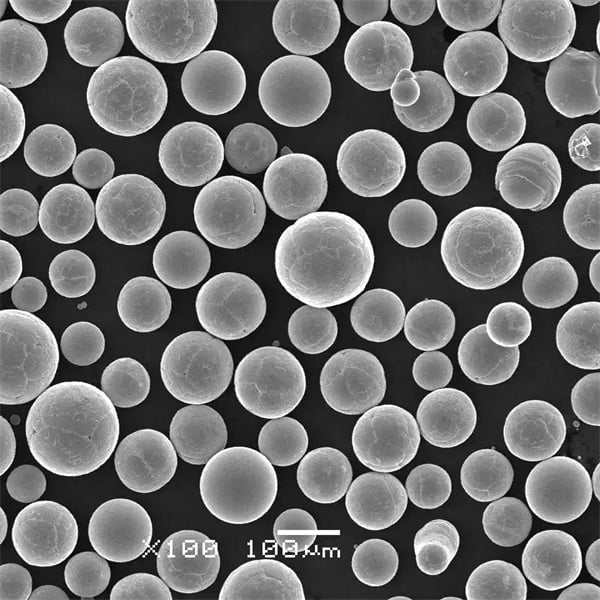
Nejčastější dotazy
Otázka: Proč je titanový prášek vhodný pro použití v letectví a kosmonautice?
Odpověď: Titan nabízí nejlepší poměr pevnosti a hmotnosti mezi kovy, takže je ideální pro snížení hmotnosti u kritických rotačních částí a konstrukčních držáků a součástí. Odolává také extrémním teplotám a namáhání při použití v motorech.
Otázka: Proč je titan oblíbený pro biomedicínské implantáty a zařízení?
Odpověď: Titan se pevně spojuje s kostí procesem zvaným osseointegrace bez imunitního odmítnutí. Díky tomu je vhodný pro ortopedické kloubní náhrady. Vykazuje také biokompatibilitu v prostředí lidského těla, takže je užitečný pro chirurgické nástroje a lékařské vybavení.
Otázka: Jak se liší titanový prášek od titanových tyčí nebo desek?
Odpověď: Titanový prášek je výchozí surovinou pro výrobu dílů s téměř čistým tvarem a aditivní výrobu. To umožňuje maximalizovat poměr nákup/let ve srovnání s obráběním velkého množství materiálu. Vysoká plocha povrchu také podporuje chemické interakce a přenos tepla užitečné v některých katalyzátorech a výměnících tepla.
Otázka: Jaké je typické cenové rozpětí běžných tříd titanového prášku a očekává se, že ceny budou klesat?
Odpověď: Komerčně čistý titanový prášek třídy 1 stojí přibližně $50-150 za kg, zatímco prášek z pracovní slitiny Ti 6Al-4V stojí $80-250 za kg. Ceny do značné míry závisí na kvalitě, způsobu výroby, objemu objednávky a zeměpisných faktorech. Nedostatek dodávek pravděpodobně znamená, že titanový prášek zůstává dražší než prášek ze základních kovů nebo oceli. Recyklace a nové postupy mohou pomoci řídit náklady.
Otázka: Jaké jsou hlavní problémy spojené s přepravou a přepravou titanového prášku na mezinárodní úrovni?
Odpověď: Vysoká afinita titanového prášku ke vzduchu nebo vlhkosti může při nesprávné manipulaci vést k požáru. Jemné částice také představují riziko výbuchu prachu. Speciální kontejnery odolné proti vlhkosti, proplachování dusíkem, regulované značení, uzemnění a bezpečnostní dokumentace pomáhají zajistit bezpečnou mezinárodní přepravu titanových surovin k výrobcům přes hranice.
Sdílet na
MET3DP Technology Co., LTD je předním poskytovatelem řešení aditivní výroby se sídlem v Qingdao v Číně. Naše společnost se specializuje na zařízení pro 3D tisk a vysoce výkonné kovové prášky pro průmyslové aplikace.
Dotaz k získání nejlepší ceny a přizpůsobeného řešení pro vaše podnikání!
Související články

Vysoce výkonné segmenty lopatek trysek: Revoluce v účinnosti turbín díky 3D tisku z kovu
Přečtěte si více "O Met3DP
Nedávná aktualizace
Náš produkt
KONTAKTUJTE NÁS
Nějaké otázky? Pošlete nám zprávu hned teď! Po obdržení vaší zprávy obsloužíme vaši žádost s celým týmem.

Kovové prášky pro 3D tisk a aditivní výrobu
SPOLEČNOST
PRODUKT
kontaktní informace
- Město Qingdao, Shandong, Čína
- [email protected]
- [email protected]
- +86 19116340731






